Product Description
Written by international Montessori and dementia experts, this indispensable guide to Montessori for elders makes it possible for any care provider to understand and implement this innovative approach to aging.
Jennifer Brush and Margaret Jarrell show care communities how to create and sustain a team that promotes elders’ functional skills, independence, and identity by integrating the Montessori philosophy throughout daily life. Based on years of research, clinical practice, and educational experience, Brush and Jarrell clearly explain the concepts behind this highly person-centered approach, how to create a prepared environment, and how to increase levels of engagement for older adults.
In addition to covering all the essentials needed to begin and sustain the Montessori philosophy with elders or people living with dementia, this new edition includes guidelines for intergenerational programming, added forms and assessments, more ready-to-use activities, and a step-by-step implementation plan.

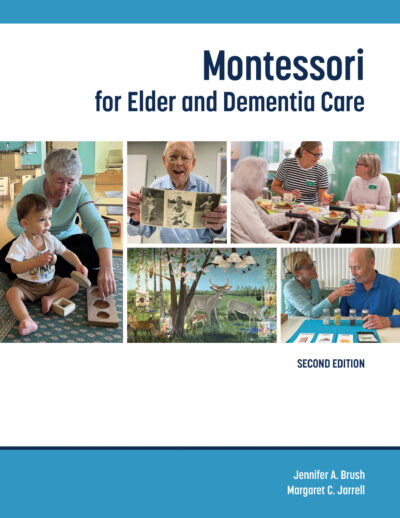
 Jennifer Brush, MA, CCC-SLP, is the Director of Brush Development, USA and the Program Director, Montessori Education for Dementia, St. Nicholas Montessori College, Dun Laoghaire, Ireland. Jennifer serves on the Association Montessori Internationale (AMI) Advisory Board for Montessori for Aging and Dementia, and she is the only AMI Certified Trainer of Trainers for Montessori for Aging and Dementia in the US. Jennifer is the co-author of several nationally recognized books on dementia.
Understanding the particular needs of healthcare organizations and families engaged in dementia care she brings more than 20 years of experience as both a leading researcher and direct-care coach in this complex field. She is a nationally recognized speech-language pathologist known for her work in the areas of memory and environmental interventions for people with dementia. She has served as the principal investigator on applied research grants that examined issues pertaining to HIV/AIDS dementia, hearing impairment, dining, swallowing disorders, and the long-term care environment. Ms. Brush has served as Chair of the Professional Development Committee of the American Speech-Language Hearing Association Gerontology Special Interest Division and on the Editorial Review Board of
Jennifer Brush, MA, CCC-SLP, is the Director of Brush Development, USA and the Program Director, Montessori Education for Dementia, St. Nicholas Montessori College, Dun Laoghaire, Ireland. Jennifer serves on the Association Montessori Internationale (AMI) Advisory Board for Montessori for Aging and Dementia, and she is the only AMI Certified Trainer of Trainers for Montessori for Aging and Dementia in the US. Jennifer is the co-author of several nationally recognized books on dementia.
Understanding the particular needs of healthcare organizations and families engaged in dementia care she brings more than 20 years of experience as both a leading researcher and direct-care coach in this complex field. She is a nationally recognized speech-language pathologist known for her work in the areas of memory and environmental interventions for people with dementia. She has served as the principal investigator on applied research grants that examined issues pertaining to HIV/AIDS dementia, hearing impairment, dining, swallowing disorders, and the long-term care environment. Ms. Brush has served as Chair of the Professional Development Committee of the American Speech-Language Hearing Association Gerontology Special Interest Division and on the Editorial Review Board of  Margaret C. Jarrell, M.Ed., is a certified Practitioner and Certified Auxiliary Educator in Montessori for Aging and Dementia through AMI. She works on a variety of projects for Brush Development, including teaching and training, coaching, and curriculum writing.
Margaret earned her B.A. in Developmental Psychology from Duke University and her M.Ed. degree from Marymount University. Here Elementary Montessori teaching credential is from the Institute for Advanced Montessori Studies, and she was a Lower Elementary Montessori classroom teacher for 12 years before moving into administration and consulting.
As both a Montessori student and now a Montessori parent, Margaret has seen firsthand how Dr. Montessori’s philosophy and methods nurture and support people’s natural love of learning, desire for independence, innate drive to do meaningful work, and need to serve with purpose as a member of a community.
Margaret C. Jarrell, M.Ed., is a certified Practitioner and Certified Auxiliary Educator in Montessori for Aging and Dementia through AMI. She works on a variety of projects for Brush Development, including teaching and training, coaching, and curriculum writing.
Margaret earned her B.A. in Developmental Psychology from Duke University and her M.Ed. degree from Marymount University. Here Elementary Montessori teaching credential is from the Institute for Advanced Montessori Studies, and she was a Lower Elementary Montessori classroom teacher for 12 years before moving into administration and consulting.
As both a Montessori student and now a Montessori parent, Margaret has seen firsthand how Dr. Montessori’s philosophy and methods nurture and support people’s natural love of learning, desire for independence, innate drive to do meaningful work, and need to serve with purpose as a member of a community. Natalie Douglas, Ph.D., CCC-SLP, is an Associate Professor in the Department of Communication Sciences and Disorders at Central Michigan University. She completed her B.S. and M.A. degrees at Ohio University. After a decade of clinical practice as a speech-language pathologist in hospital and long-term care environments, she completed her Ph.D. at the University of South Florida. Her research aims to advance best, person-centered practices in communication and quality-of-life interventions for people with dementia, aphasia, and other acquired communication disorders in adults. She also works to empower local healthcare teams to support quality improvement initiatives and person-centered care through applying principles of implementation science.
Natalie Douglas, Ph.D., CCC-SLP, is an Associate Professor in the Department of Communication Sciences and Disorders at Central Michigan University. She completed her B.S. and M.A. degrees at Ohio University. After a decade of clinical practice as a speech-language pathologist in hospital and long-term care environments, she completed her Ph.D. at the University of South Florida. Her research aims to advance best, person-centered practices in communication and quality-of-life interventions for people with dementia, aphasia, and other acquired communication disorders in adults. She also works to empower local healthcare teams to support quality improvement initiatives and person-centered care through applying principles of implementation science.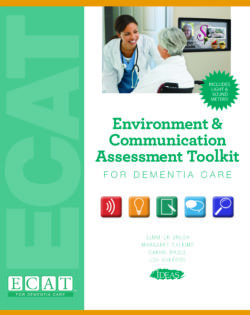
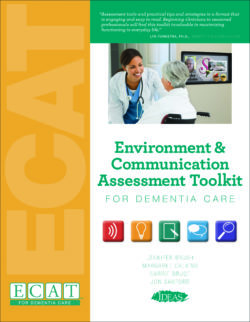
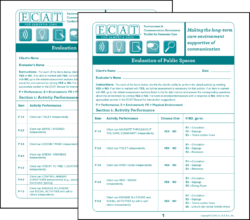
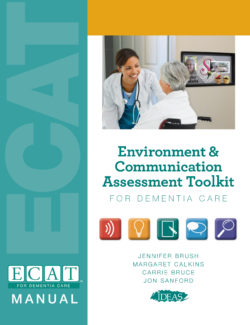
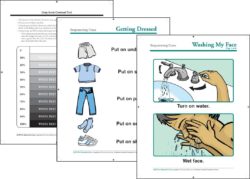
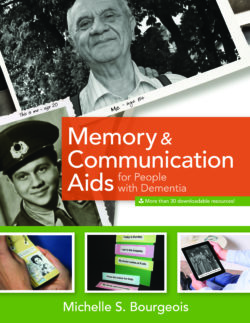
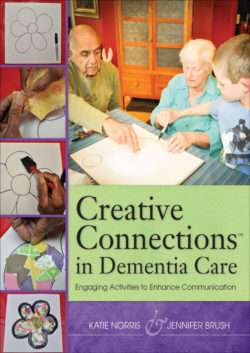
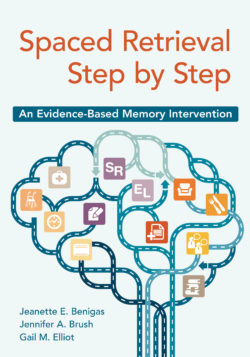
HPP Admin –
“A must-read for individual practitioners and organizations involved in elder care. The book’s real strength lies in its ability to seamlessly integrate Montessori principles in elder care, creating ‘meaningful engagements’ that prioritize independence, dignity, and a sense of purpose.”
–Nicholas Breakwell, Ph.D.
CEO, St. Nicholas Montessori Society of Ireland
HPP Admin –
“A groundbreaking resource that will undoubtedly leave a lasting impact on the well-being of those living with dementia and the individuals dedicated to their care. It effortlessly weaves together research-backed theories with real-world applications, creating a comprehensive guide that is both accessible and transformative.”
–Addie M. Abushousheh, Ph.D., EDAC, Assoc AIA
Organizational and Environmental Gerontologist, Research Associate, The Center for Health Design
HPP Admin –
“Suitable for a wide audience, from family caregivers to healthcare professionals… This book stands out as an indispensable resource for anyone touched by the realities of dementia. With a perfect blend of empathy, expertise, and practical advice, it provides a comprehensive guide that is both informative and deeply compassionate.”
–Lynne Giacobbe
CEO, Kendal at Home (Westlake, Ohio)
HPP Admin –
“This comprehensive guide includes straightforward instructions for incorporating the Montessori philosophy into everyday activities and roles, along with items needed, practical how-to instructions, and beautiful images to aid learning and application. Forms for individual assessment and implementation and suggestions for modifying activities to be simpler or more complex are included. This resource from expert authors provides a trusted tool to competently and confidently implement the Montessori philosophy to facilitate older adults’ meaningful engagement within their community.”
–Susan Almon-Matangos, M.S., CCC-SLP
Speech-Language Pathologist, subject matter expert, and writer
HPP Admin –
“This book is both highly readable and exceptionally practical.”
–Margaret Calkins, Ph.D., EDAC, FGSA
Senior Researcher and Board Chair, IDEAS Institute